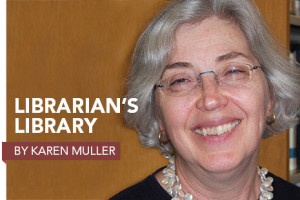
North Dakota Superintendent of Public Instruction Kirsten Baesler is well aware of the centrality of school libraries in K–12 schools. Before her election to state government in November 2012, Baesler served as both library media specialist and assistant principal at two elementary schools in Bismarck—dual roles she saw as complementary because “understanding the whole scope and sequence of our K–6 curriculum as a library media specialist provided comprehensive knowledge I needed in my administrative leadership role.” Beginning her school library career 22 years ago as a paraprofessional, Baesler has served as a member of the NDLA executive board and as president of the Mandan Public School District board. American Libraries interviewed Baesler on June 6.
AMERICAN LIBRARIES: What motivated you to run for the office of state superintendent of North Dakota schools?
KIRSTEN BAESLER: Public education has been my passion my entire adult life. I am passionate about teaching and learning and view myself as a public servant advocating for the needs of children of all ages.
How has the reality compared to your expectations?
I truly didn’t have a preconceived notion of what being state superintendent would entail. I knew that it would involve long hours and a lot of work, which has been true—especially as my term began just before our state’s biennial legislative session. However, advocating for and serving the educational needs of our state’s children is very rewarding. That part will never get old.
How does your school library background influence your work as state superintendent of schools? For instance, does it change your programmatic approach toward improving literacy from that of your predecessor?
My personal approach—to focus on what’s best to prepare students to be successful in college or careers after graduation—is my primary influencer. A goal of North Dakota’s library media programs is to create lifelong learners and critical users of information.
What are the three most critical issues in K–12 education today?
Ensuring students graduate on time with the skills they need to succeed in college or a career; consistent academic standards and outcomes that still provide for local control; and sufficient resources to accomplish these tasks.
Where do school librarians fit in addressing those issues in North Dakota?
Literacy is at the heart of ensuring our students graduate on time and do so with the knowledge and skills they need to succeed in life. Today’s school librarians not only foster reading literacy—an essential component in learning math, science, and other subjects—but also life skills such as technological literacy and critical thinking skills that help students become better learners and achieve educational goals.
You’ve been supportive of local control of school curriculum within broader guidelines such as the Common Core State Standards. What’s your opinion on restoring the recommendation to the Elementary and Secondary Education Act that every school employ full-time a credentialed school librarian?
Even the best-intended recommendations have a tendency to become requirements. I firmly agree that having a full-time credentialed school librarian—and the library resources needed to do the job well—is an incredible asset to any school. But in my smallest school district in North Dakota, with just three students, a requirement for a full-time credentialed school librarian wouldn’t be economically feasible or fiscally responsible. This is why local control is critically important for the success of our students.
What would you say to a school principal who sought your advice about cutting the position of the school librarian for budgetary reasons? What advice would you give school librarians on advocacy at the building and district level?
I would argue that the school librarian is essential to meeting the higher standards that will be expected from our students with Common Core. It is more vital than ever before to have quality credentialed school librarians assisting students in selection of suitable text and directing them toward a robust collection of nonfiction companions to traditional fictional works. My advice to both principal and librarian would be to look for ways to address budgetary issues that achieve outcomes and are still cost-effective: collaborative programs, cost-sharing, and every other alternative they can identify.


